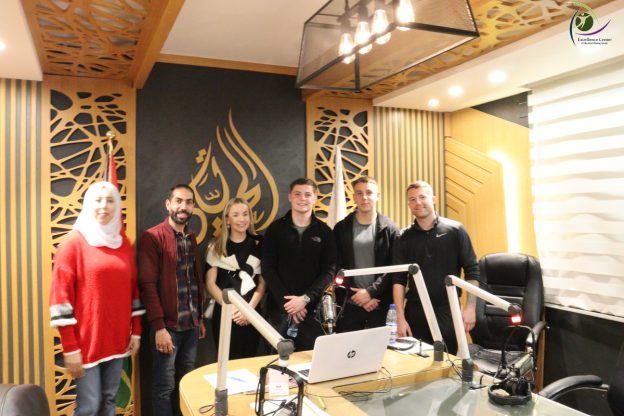Thinking of coming to Palestine? Got questions about safety or everyday life in the West Bank? We’ve compiled a list of some of the most commonly asked questions from people who are planning to travel to Palestine. See our answers below, or get in touch with our team to find out more at rafat@excellencecenter.org.
Table of Contents
Is the water in Palestine clean enough?
Yes! It might be surprising to hear, but Palestine has access to clean drinking water on tap. It’s completely safe to fill your water bottle whenever you’re thirsty. Having said that, if you prefer to drink bottled water, there is plenty around at a reasonable price to help you stay hydrated.
What kind of electricity plug do Palestinians use?
The electricity plug used in Palestine is a three-pronged plug. You can easily buy one of these from any shop that sells travel supplies, but a European two-prong adaptor works just as well if you already have one!
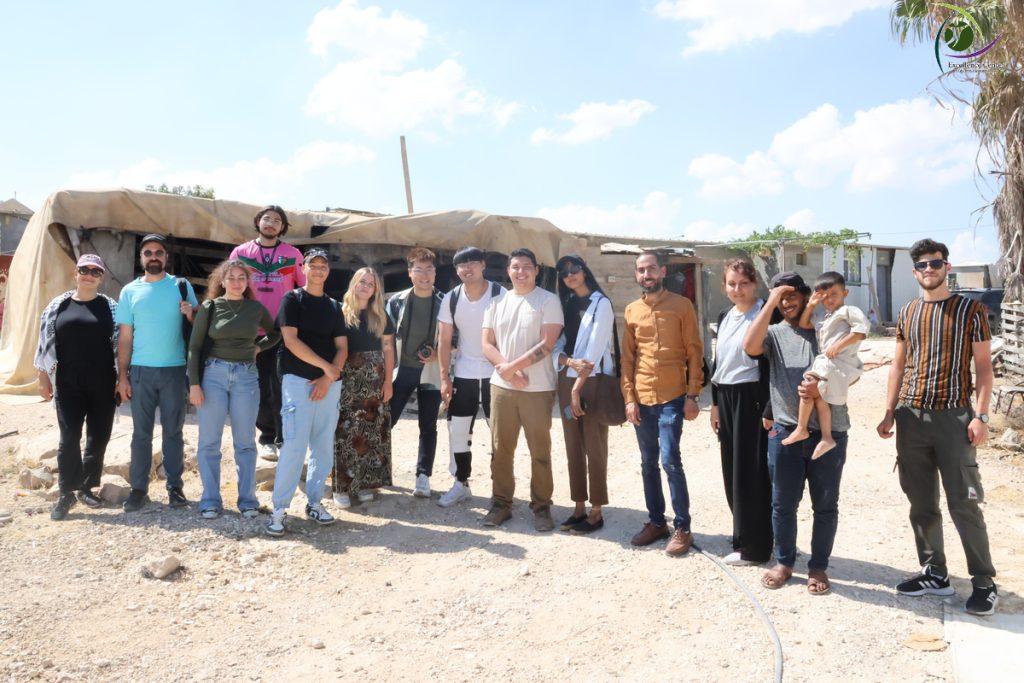
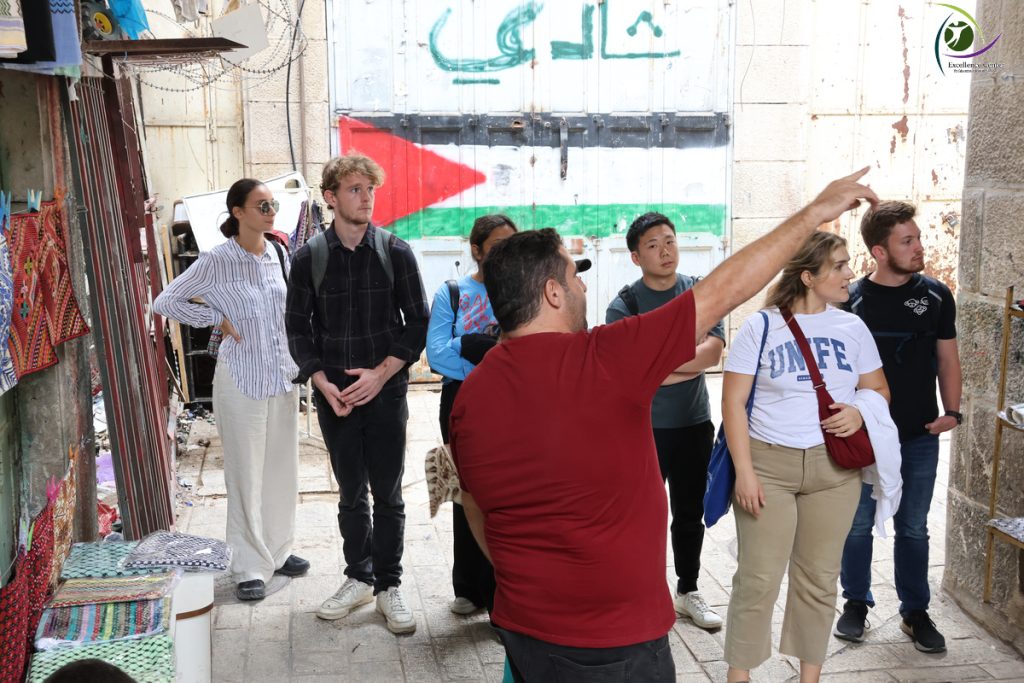
Walking in the streets in Palestine
The streets of Palestine are very lively. People tend to walk around a lot, and there are many small shops and street-side stalls selling fruits, vegetables, sweets, and clothing. During the day, the streets aren’t very busy, but at night they really come alive.
Cities like Bethlehem and Jerusalem have beautiful ‘old cities’, usually narrow streets of old stone polished from centuries of use. Here you can find all kinds of wares, like local handmade crafts, beautifully embroidered scarves and bags, and delicious sandwiches made fresh for when you get peckish.
In some places, like Hebron, kids ride bikes on the road, and young men ride horses down main streets. You might also see donkeys pulling carts of vegetables led by the vendor.
The generosity of Palestinian families
Generosity is part of the culture in Palestine, and you will feel this as soon as you spend time with anyone here. Palestinian families like to make people feel welcome in their homes and in their country, so don’t be surprised if you are invited to someone’s house to meet their family and eat a delicious local meal! If it’s dinner time, you may also be invited to stay the night.
How is religion involved in the Palestinian community?
Palestine is a Muslim majority area, so religion plays a large role in the society, the extent to which depends on where you are. For example, some cities like Hebron are more conservative, so people tend to observe their religion more. You will see people carrying their Tasbih beads, and there are prayer mats in some of the cafes for people to use in case they need it. People are also quite conservative in the way that they dress.
Compare this to a city like Ramallah in the north, which is more international and cosmopolitan, and the religious aspect of society isn’t quite as prominent just from looking. People tend to practise their faith in the way that they like to, and like in any society, there are people who are very adherent, people who are not at all, and many others in between.
Either way, if you’re near a mosque, you’ll hear the call to prayer sounding across the surrounding areas multiple times of day.
What does being a foreigner in Palestine look like?
Being a foreigner in Palestine can look different depending on which part you are in. For example, in Jerusalem and Ramallah, there are many more internationals, a lot of whom work for non-government organisations or entities like the United Nations. In these cities, it is normal to see foreigners from all over. For cities like Nablus and Bethlehem, there is usually a lot of tourism, so foreigners are very welcome to support local businesses.
For cities like Hebron, where there isn’t a large community of foreigners or much tourism, seeing foreigners can be a bit of a novelty. You will likely have a lot of locals coming up to you to ask where you’re from and welcome you to Palestine. People might also look at you or walk up to you and introduce themselves, because they’re not used to seeing people like you around. Remember, it’s just curiosity and not meant as anything rude.
What is daily Palestinian life like in the West Bank?
Daily life in Palestine is similar to daily life anywhere! People rise early, go to their work or their school, spend time with their families and friends, and hang out at their favourite cafes. The difference is that movement is heavily restricted for Palestinians between different cities, and even within the city of Hebron for people who live there. This can mean significant delays in travel, difficulty working or being educated outside the city they live in, and having to face the stress of crossing checkpoints. Despite the constant reminders of military occupation, Palestinians continue to live their lives as normally as possible.
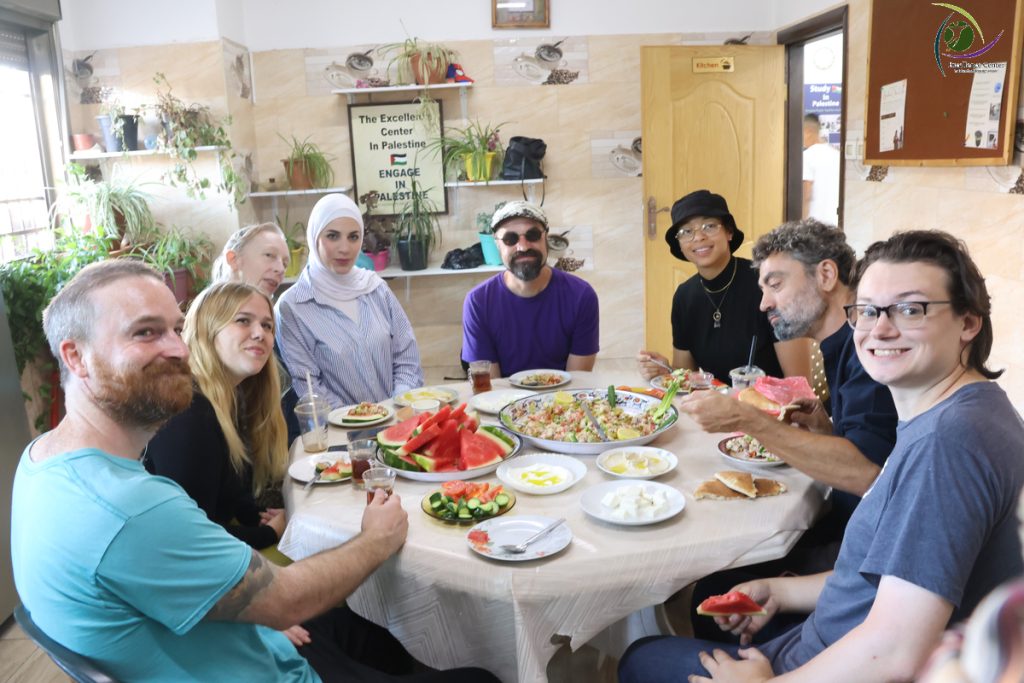

For volunteers at the Excellence Center, the day begins with a hearty Palestinian breakfast of bread, hummus, labne, avocado, olives, za’atar, shakshuka, tea, and coffee. Afterwards comes the Arabic class, where you will learn some spoken language that will help you get around. In the afternoon, volunteers undertake their program activities, like meeting with journalists and human rights organisations, visiting refugee camps and rural villages, learning about Hebron and the two parts of the city, and visiting local businesses like a local hand-painted ceramics factory.
What if I asked a Palestinian for help?
It is more likely that you wouldn’t even have to ask! If anyone not obviously from Palestine was walking down the street looking lost, there is a very good chance that someone would approach you and ask if you need help. One of our volunteers, Eva, shares her experience arriving in the West Bank:
“I was worried about finding the right Service from Jerusalem to Hebron. But I had barely set foot in Damascus Gate with my suitcase in tow before someone was asking me where I wanted to go and guiding me to the bus that I needed. As a first timer, this was incredibly helpful.
“When I arrived in Hebron, I realised my phone data wasn’t working and wandered around for a minute before a nearby shopkeeper came to ask me if I was okay. He called the number of the person I was going to meet, invited me into his shop, gave me coffee, and then walked my suitcase to the meeting point I needed to go to. It was such a lovely show of generosity from someone I didn’t even know.”
Is it safe to live in a country under occupation?
For the Palestinians, it is not safe. Many of them live in constant fear of being stopped and searched at checkpoints, having travel interrupted by arbitrarily closed gates, or even being detained or arrested for no reason. The occupation is designed to make life difficult for the local people. However, this is not the same for internationals. They are welcome to get a three-month visa and to travel around without fear. Having said that, it is advisable to check the news and avoid travelling to areas where there might be any unrest or military activity.
What does it mean to be a Palestinian refugee?
In 1948, the violent formation of Israel caused the Nakba, or ‘catastrophe’ in Arabic – a violent expulsion of hundreds of thousands of Palestinians from their homes. Many fled to neighbouring Jordan or further afield, but some relocated to refugee camps in what is now known as the Occupied West Bank. While the initial tents that housed these refugees have become more permanent structures, they are still classified as refugees and are still waiting to return to the land they were pushed from, even two generations later.
How much does living in Palestine for a month cost?
The currency in Palestine is the New Israeli Shekel (NIS), and while some places like supermarkets and restaurants allow you to pay by card, it is mostly a cash economy. This means you should carry cash with you, especially when paying for public transport.
The monthly cost of living depends on your situation. For example, if you are volunteering through an organisation like the Excellence Center that provides accommodation within their tuition costs, living in Palestine can be very affordable (depending on your spending habits). Outside accommodation and tuition, your main expenses will be phone data (if you choose to get a SIM card), any travel you might choose to do, and lunches or dinners with your fellow volunteers.
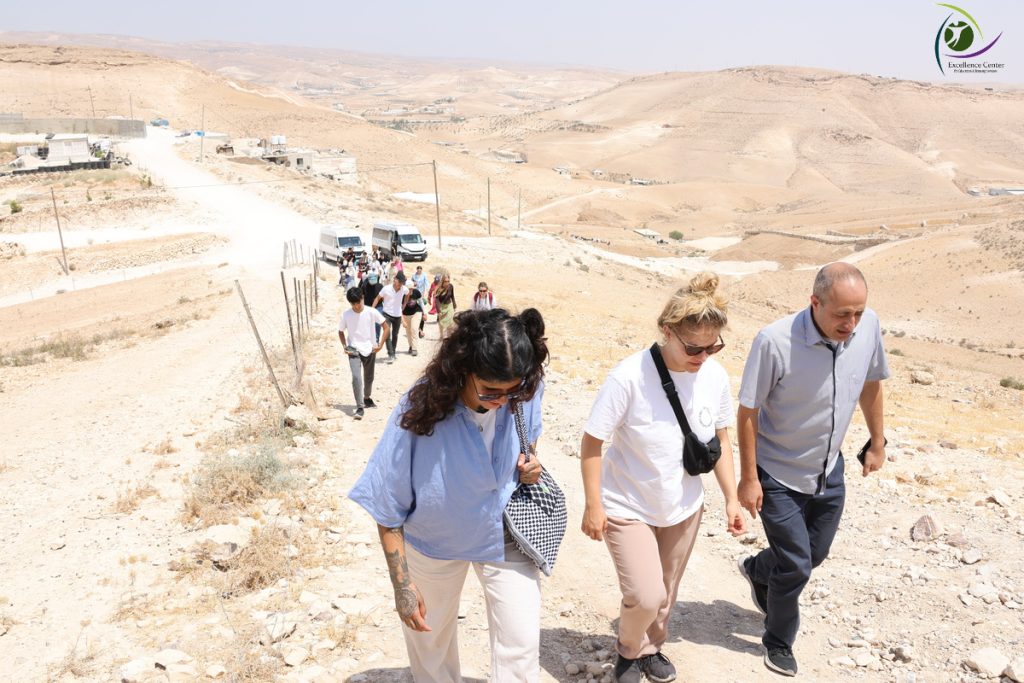

Because of limited imports and exports, some things are more expensive than you might be used to. However, some things, like food, can be a lot cheaper (hello, 15 falafels for 3 shekels!).
How do Jewish settlers live in Hebron? Do they have contact with Palestinians?
According to the Hebron Protocol, signed by the Palestine Liberation Organisation and the Government of Israel in 1997, the city of Hebron was divided into two sections, known as H1 and H2. Area H1 is under Palestinian civil and security control, making up 80% of the city. Area H2 is under Israeli military/security control and Palestinian civil control, making up 20% of the city, including the whole Old City of Hebron.
Currently, there are around 700 settlers, guarded by many military personnel, and around 35,000 Palestinians living in H2. There is little to no interaction between settlers and Palestinians, and Palestinians in H2 are subject to significant movement restrictions and road closures, including the closure of the main Shuhada Street and the closure of much of the Old City.
Want to know more?
Thinking of visiting Palestine? Why not make a real difference and include some volunteering or Arabic study to your travel plans. The Excellence Center Palestine has a wide range of programs designed for people from all skill levels and interest areas. Simply head to our website for more information or reach out to rafat@excellencecenter.org.
